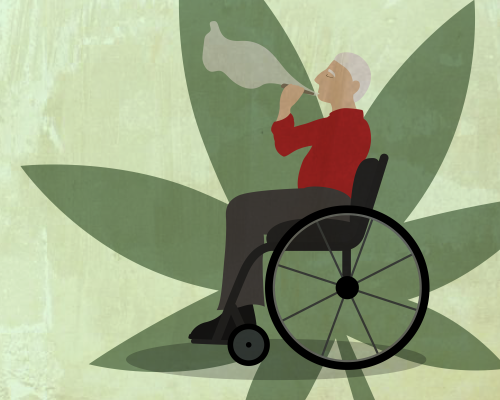Could Medical Marijuana Be Just What the Doctor Ordered? Here’s What You Should Know

If you’ve had a spinal cord injury for a while, you’ve probably got your ear to the ground when it comes to new approaches and treatments that can help with some of your complications. If you haven’t already experimented with medical marijuana, you might be wondering if it’s something that could help you.
The short answer: we don’t know. Although humans have used cannabis therapeutically for thousands of years, research is still relatively limited on its benefits. When it comes to the population of people with spinal cord injuries, there’s even less known about potential therapeutic applications of cannabis.
You might be able to find anecdotal evidence – stories about people who feel they have benefited from medical marijuana – but that doesn’t prove much. And it definitely doesn’t predict what effects this plant might have on your own health. Individuals can respond very differently to the various components of cannabis.
A 2021 research review at the University of Washington, for example, found that the studies done so far on the use of cannabis for pain in SCI were too inconsistent (factors differed like the amount of cannabis used, or the length of the experiment) to make any concrete conclusions.
Fortunately, there are more studies underway right now around the world. For now, though, trying out cannabis for your symptoms may mean going through a little trial and error. Here are a few pros and cons to know about first.
Pros:
- There is the potential that cannabis might help certain people with spinal cord injury with pain, spasms, sleep disturbances, and mental health issues like depression and anxiety.
- There’s no need to get stoned in order to benefit therapeutically from cannabis. Many products on the market have higher levels of CBD (cannabidiol), and lower levels of THC (the compound that makes you high).
- There’s also no need to smoke it. These days, cannabis is readily available in other forms, such as oils and capsules.
- If cannabis helps your symptoms, then there’s a chance you might be able to reduce or eliminate other medications you take for the same problems. That could mean fewer uncomfortable or risky side effects. Opioids taken for pain, for example, can cause sleep apnea, confusion, and constipation (which, as we all know, is not ideal if you have an SCI).
- If you have a doctor’s authorization to use cannabis for medical purposes, and if you purchase your products from a licensed company, you are allowed to include this as a medical expense on your taxes.
Cons:
- Medical marijuana is not cheap, especially if you use it regularly. If your drug plan doesn’t cover it (or you have no drug plan at all), the expense will add up.
- Cannabis isn’t without its own health risks. It can cause a range of unwanted effects like difficulty concentrating or a sense of panic. Even a high-CBD, low-THC product can have side effects. It can make you feel drowsy, irritable or sick to your stomach. It may also interfere with other medications you’re taking.
- If cannabis does help your pain, it doesn’t necessarily follow that you’ll stop taking other medications. An Eastern Michigan University study found that people with spinal cord injuries who were taking cannabis therapeutically were actually a little more likely to be on opioids compared to people with SCI who didn’t use cannabis at all.
If you’re interested in experimenting with cannabis, start by speaking with your healthcare provider. They can help you decide if it’s worth a try. They may refer you to a clinic that specializes in and prescribes medical marijuana. Doctors at these clinics can answer your questions, point you towards licensed suppliers and monitor your cannabis use.
There may be a lot of unknowns when it comes to trying medical marijuana with a spinal cord injury. But you can still take steps to ensure you’re doing it as safely as possible.
